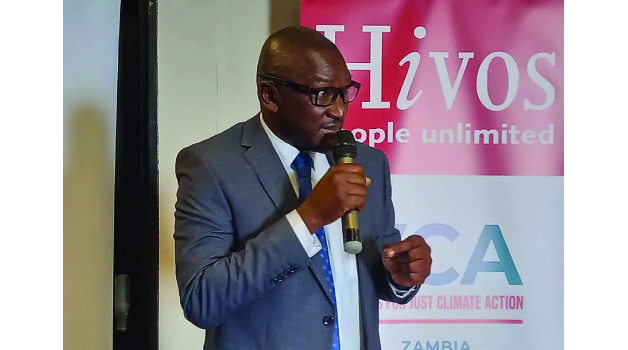By JOSIAH MPOFU-
Green Economy and Environment Minister Collins Nzovu says the agriculture sector in Zambia is currently facing challenges of low productivity due to climate risks.
Mr Nzovu said this in Lusaka when he graced the launch of the Accelerating Impacts of CGIAR Climate Research for Africa (AICCRA) project, which was aimed at scaling up climate science to support agri-business through a Zambia accelerator grant.
Mr Nzuvu, who named the climate risks as high temperatures, frequent droughts and floods, among others, said such developments had affected the food systems and amplified the incidence of disease and pest outbreaks, thereby undermining livelihoods.
He said Government was in the process of developing sustainable and appropriate programmes for both crops and livestock to mitigate effects of climate change.
The minister thanked the World Bank for funding the project, which would help to tackle climate change challenges.
“Agricultural production faces climate risks, which include higher temperatures, shorter growing seasons, more extreme and frequent droughts and floods, and increased water scarcity. This is compounded by limited access to data and information by especially the smallholder farmers, to support their preparedness and responses,” Mr Nzovu said.
He said the initiative would help to complement Government efforts in fostering accelerated national development through the mobilisation and sustainable use of human and natural resources for the empowerment of every Zambian citizen.
The accelerator grant would provide US$50, 000 to each small and medium agribusiness that was working to provide actionable climate information services or climate smart agriculture innovations.
“Many of the affected areas already have high poverty levels, hunger and malnutrition, with the highest burden experienced by women and youth from vulnerable communities. Women grow most of Africa’s food and own one-third of all small and medium-sized enterprises (SMEs),” Mr Nzovu said.
He called on the project to empower more women and young farmers in order to promote healthier diets and protect the natural environment from further degradation.
Mr Nzovu emphasized the need to support the agribusiness ecosystem, particularly SMEs, as they played a major role in agricultural and economic development.
International Water Management Institute (IWMI) research officer Nohayi Ngowenani said the grant would be given to SME business partnerships that were involved in sustainable financing of off-grid solar irrigation and integrated aquaculture-agriculture systems.
Ms Ngowenani said the grant would also go towards addressing drought issues through the production ofclimate smart seed varieties of various crops, among them maize and legumes, as well as production of small ruminants, which included chickens and goats.
AICCRA is a two-year project which seeks to partner with other private sector players to invest in youths and women entrepreneurship by helping them with startup capital through the application of appropriate financial models.
The project will be implemented in Kasama, Luwingu, Mungwi, Mpulungu and Mbala, districts in Northern Province; and Mansa, Samfya, and Chipili districts in Luapula province.
The project will also register its presence in Central, Eastern, Lusaka and Southern provinces. – NAIS.







